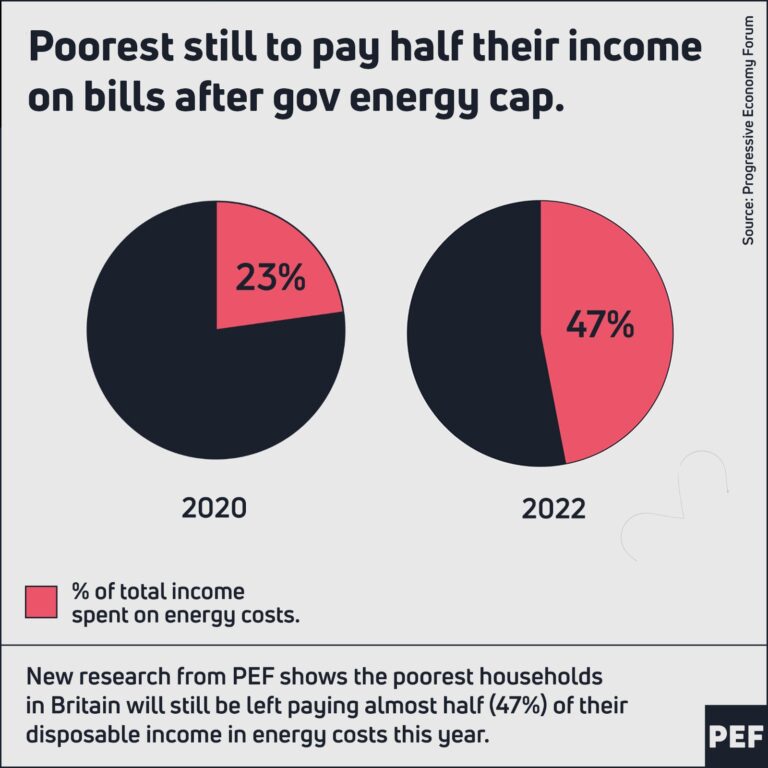Last month the International Monetary Fund (IMF) released their first Fiscal Monitor of the year – a document surveying and analysing the latest public finance developments as part of their broader World Economic Outlook. As one of the major international organisations working on economic issues, their pronouncements matter; they set the tone for policy debates around the globe.
So it was disappointing to see that the IMF framed the challenges facing the global economy around high government debt. This report reinforces narratives around government debt that threaten the long-term health of the UK economy, asking countries to “capitalise on good times” and “save for a rainy day” by paying down government debt.
Where to start?
U-Turn
The IMF report is a significant departure from some of the prominent IMF research of recent years, especially from one of their head researchers Jonathan D. Ostry. In 2015, for example, Ostry and his colleagues published a paper stating that the UK is one of many countries with ample fiscal space, meaning that “the costs [of paying down the debt] will be larger than the resulting benefits”.
More recently, an IMF working paper from this month notes that for countries like the UK, growth rates are very likely to outstrip the interest paid on government debt in the long term. The author concludes: “if true… [this means that] unless governments can commit to infinitely large deficits, they can issue as much debt as they like without becoming insolvent”.*
Governments can issue too many bonds – they run up against real resource constraints, meaning roughly that they can’t spend more than the structure of their economies allow. (Of course, the government can itself change the structure of the economy through its investment programmes – the point is that opportunities for productive expenditure are finite). But the ‘solvency’ of governments like the UK’s is not an issue. Government spending limits should be discussed with reference to the state of the economy, not ‘debt thresholds’ pulled from thin air.
It’s the economy, stupid!
Indeed, banging on about debt-GDP ratios and ignoring everything else going on in the economy is a recipe for disaster. The UK’s economic experience over the past decade bears witness to this.
In my last blog, I wrote about the importance of borrowing to invest. The problem with the IMF and others’ rhetoric around high debt ratios is that it unnecessarily suppresses the government’s ability to invest in the country’s future, scaring electorates and financial markets.
This week, I attended a conference between Labour and the finance sector, where Shadow Chancellor John McDonnell outlined the three major challenges facing the British economy: Brexit, technological revolution, and climate change. The UK is simply not prepared for these.
The sensible thing to do would be to borrow to meet these challenges while interest rates are low. The UK can actually borrow at interest rates under 2% at the moment, below the current and target inflation rate. In real terms, then, it is likely that the government will end up paying back less than it borrowed on debt taken out now. Any sensible organisation would use this window to invest in their futures. But no – the debt must be paid down!
We also have to remember that much of this debt will be owned by UK households. In the US, for example, the Roosevelt administration mobilised resources for World War II by asking households to lend them money through their purchase “War Bonds”. These bonds provided a home for US household savings, and were widely use as down-payments for buying a house. (Credit to John Weeks’ Economics of the 1% for this point.)
Government debt needn’t a burden on the country’s economy; instead, it can be a way of sharing resources over time to the benefit of both government and households. Bonds provide a safe haven for savings, while governments can prepare for the biggest challenges facing our society.
Ironically, one of the lead authors of the IMF report declared that “successful governments are those that prepare ahead for storms looming on the horizon”. I agree – but this involves a bold programme of investment, not obsessing over government debt.
PFI madness
The use of Private Finance Initiatives (PFI) – government outsourcing to the private sector à la Carillion – provides another instructive example. The National Audit Office’s report into PFI points out that the interest rates on borrowing for PFI have been between 2-5% higher than the interest on straightforward government borrowing.
This adds up. On a 30-year loan for £100m, the difference between interest rates of 3% and 8% is the difference between paying back £153m and £266m. What with all the other problems with PFI, why on earth does the government use it?
The NAO answer that question too. Thanks to the (strange) way we run our National Accounts, “most private finance debt is off-balance sheet” – it doesn’t show up in government debt to GDP figures, even though this is debt the government owes. For departments under pressure, this results in “incentives, unrelated to VfM [value for money], which have driven the use of private finance”.
The Cameron-Osborne government opted not to remove these incentives in its reform of PFI, despite a “lack of data available on the benefits of private finance procurement”. It’s almost as if austerity wasn’t motivated by a sincere commitment to prudence, but by a desire to shrink the state.
It’s still raining
And then there’s austerity itself. In the UK, the obsession with cutting the deficit and paying down the debt came at the expense of a proper recovery.
Wages have not yet reached their pre-crash levels, and the realities of the labour market beyond narratives of ‘record employment’ are further cause for concern – the rise in economic insecurity, for example. The IMF asks us to save for a rainy day, but the weather for workers in the UK isn’t quite sunny yet.
Crucially, these pressures are driving the rise in household borrowing, bringing the UK to the brink of a private debt crisis.
This link between austerity and private debt is important. Asking both the government and households to pay down their debts at the same time is a recipe for disaster; as Johnna Montgomerie writes, austerity “shift[s] the costs of economic recovery on the household sector using private debt”.
And so it is extremely irritating that the IMF starts its report by commenting on the high level of public and private debt, but then fails to analyse the latter and its link to government actions. In essence, it uses high private debt to motivate cuts to public spending.
Worse still, it claims that “high government debt levels make it difficult to conduct countercyclical fiscal policy”. It is as if the financial crisis never happened. Has the IMF learnt nothing?
Conclusion
To be fair to the IMF, the Fiscal Monitor is a bit of a blunt instrument – you have to try and address the fiscal situation of 195 countries at once in a finite space.
We should welcome, too, its advice to the UK government that “fiscal consolidation… should have greater reliance of revenue measures, as earlier adjustment fell heavily on expenditure”, and its (perhaps tokenistic) request for countries to avoid “excessive inequality”. If you must carry on with paying down the deficit, do it through progressive taxation, not through a programme of cuts set to exacerbate inequality.
Still, the IMF’s report perpetuates a number of pernicious narratives about how economies work. These can seem complex and abstract, but we must be able to understand and challenge these if we are to change the way our economies are run. * Under a set of extremely conservative modelling assumptions, the author estimates a ‘debt limit’ for the UK of 140% of GDP – but this is far below levels of debt that the UK managed just fine with, e.g. after WWII.








